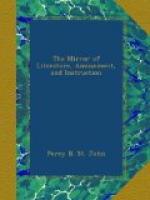“Yours, &c.”
PORSON.
“I remember to have seen Porson at Cambridge, in the hall of our college, and in private parties, but not frequently; and I never can recollect him except as drunk or brutal, and generally both: I mean in an evening, for in the hall, he dined at the Dean’s table, and I at the Vice-master’s, so that I was not near him; and he then and there appeared sober in his demeanour, nor did I ever hear of excess or outrage on his part in public,—commons, college, or chapel; but I have seen him in a private party of under-graduates, many of them freshmen and strangers, take up a poker to one of them, and heard him use language as blackguard as his action. I have seen Sheridan drunk, too, with all the world; but his intoxication was that of Bacchus, and Porson’s that of Silenus. Of all the disgusting brutes, sulky, abusive, and intolerable, Porson was the most bestial, as far as the few times that I saw him went which were only at William Bankes’s (the Nubian discoverer’s) rooms. I saw him once go away in a rage, because nobody knew the name of the ‘Cobbler of Messina,’ insulting their ignorance with the most vulgar terms of reprobation. He was tolerated in this state amongst the young men for his talents, as the Turks think a madman inspired, and bear with him. He used to recite, or rather vomit pages of all languages, and could hiccup Greek like a Helot; and certainly Sparta never shocked her children with a grosser exhibition than this man’s intoxication.
“I perceive, in the book you sent me, a long account of him, which is very savage. I cannot judge, as I never saw him sober, except in hall or combination room; and then I was never near enough to hear, and hardly to see him. Of his drunken deportment, I can be sure, because I saw it.”
THE COUNTESS GUICCIOLI.
It was about the time (1819) when the foregoing letter was written, and when, like the first return of reason after intoxication, a full consciousness of some of the evils of his late libertine course of life had broken upon him, that an attachment differing altogether, both in duration and devotion, from any of those that, since the dream of his boyhood, had inspired him, gained an influence over his mind which lasted through his few remaining years; and, undeniably wrong and immoral (even allowing for the Italian estimate of such frailties) as was the nature of the connexion to which this attachment led, we can hardly perhaps,—taking into account the far worse wrong from which it rescued and preserved him,—consider it otherwise than an event fortunate both for his reputation and happiness.




